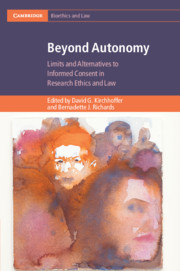Book contents
- Beyond Autonomy
- Cambridge Bioethics and Law
- Beyond Autonomy
- Copyright page
- Contents
- Tables
- Contributors
- Acknowledgements
- Introduction
- Part I Exploring Problems of Respect for Autonomy in Bioethics, Law and Society
- 1 Autonomy and the Law
- 2 Lack of Autonomy
- 3 Diminished Autonomy
- 4 Compromised Autonomy
- Part II The Search for Alternative or Complementary Concepts Surrounding Autonomy
- Part III Beyond Autonomy: Turning to the Community to Protect the Individual
- Index
- Books in the Series
2 - Lack of Autonomy
Debates Concerning Research Involving Children
from Part I - Exploring Problems of Respect for Autonomy in Bioethics, Law and Society
Published online by Cambridge University Press: 20 September 2019
- Beyond Autonomy
- Cambridge Bioethics and Law
- Beyond Autonomy
- Copyright page
- Contents
- Tables
- Contributors
- Acknowledgements
- Introduction
- Part I Exploring Problems of Respect for Autonomy in Bioethics, Law and Society
- 1 Autonomy and the Law
- 2 Lack of Autonomy
- 3 Diminished Autonomy
- 4 Compromised Autonomy
- Part II The Search for Alternative or Complementary Concepts Surrounding Autonomy
- Part III Beyond Autonomy: Turning to the Community to Protect the Individual
- Index
- Books in the Series
Summary
Imagine that a researcher approached you about enrolling your child in a new study he wished to undertake. Your child – who might be as young as 3 1/2 months old – was about to have surgery for congenital heart disease. While your daughter was under anaesthesia, the researcher wanted permission to remove her thymus gland and stitch a full-thickness skin graft from an unrelated adult to her chest. The scientist was curious about the role of the thymus in immune regulation and tissue rejection.
- Type
- Chapter
- Information
- Beyond AutonomyLimits and Alternatives to Informed Consent in Research Ethics and Law, pp. 33 - 47Publisher: Cambridge University PressPrint publication year: 2019
- 2
- Cited by

